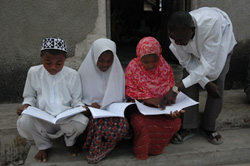You are here » Home » Telling Our Story
Success Story
Teaching students in religious schools to stay safe from HIV/AIDS
Educating Children About HIV/AIDS

| |
Photo: USAID/Imani Cheers
|
|
Maalim Ally reads daily lesson with his students outside his Madrassa in Kinodoni, an area northwest of Dar es Salaam, Tanzania.
USAID is working with Tanzania’s National Muslim Council to train Madrassa teachers in how to tell their students about ways to prevent HIV and reduce stigma and discrimination.
|
At the Ibtideae Madrassa in Kinodoni, within Dar es Salaam, Tanzania, morning classes begin with prayers. In a one-room cement building, three dozen students aged 4 to 12 sit in neat rows on a worn red rug, listening intently to their Maalim, or instructor, Omari Ally. Madrassas are schools where children come to study the Koran. In addition to formal public schooling, these students attend Madrassas six days a week for up to four hours each day. As the boys and girls sit in class, a heavy rain begins to batter the metal roof. Students strain to hear Maalim Ally’s message. Today, they are learning about HIV/AIDS prevention.
To help stem the spread of HIV, USAID is working with Tanzania’s National Muslim Council (BAKWATA) to train Madrassa teachers in ways to tell students about how to prevent HIV and reduce stigma and discrimination. In collaboration with USAID and the President’s Emergency Plan for AIDS Relief, BAKWATA created a unique way to incorporate HIV/AIDS prevention messages into the lesson plan. This had never been done in Tanzania, where many believe that HIV/AIDS is a curse from God, rather than a preventable disease. Even today, many families hesitate to discuss HIV/AIDS within their homes. Muslim leaders agreed there were benefits to incorporating lessons about HIV prevention into the Madrassa curriculum and they helped produce the Islamic Religious Teacher’s Guide on using the subject in school.
On an early morning during Tanzania’s cool dry season, Maalim Ally teaches a lesson from chapter two of the manual. Titled “Environments that Can Cause AIDS Infections”, children learn how to protect themselves from diseases through good behavior. This includes withstanding the desire to watch inappropriate media images, resisting negative peer pressure, and encouraging faithfulness in committed relationships. USAID helped print and distribute 2,500 manuals in the Dar es Salaam and Iringa regions, reaching some 12,500 Tanzanian youth, and held a six-day training for 54 Maalims on teaching HIV/AIDS issues to young girls and boys. In a country where most new infections occur among 15- to 24-year olds, USAID and BAKWATA are working together to save these young lives one student at a time.
Print-friendly version of this page (426kb - PDF)
Click here for high-res photo
Back to Top ^ | 

